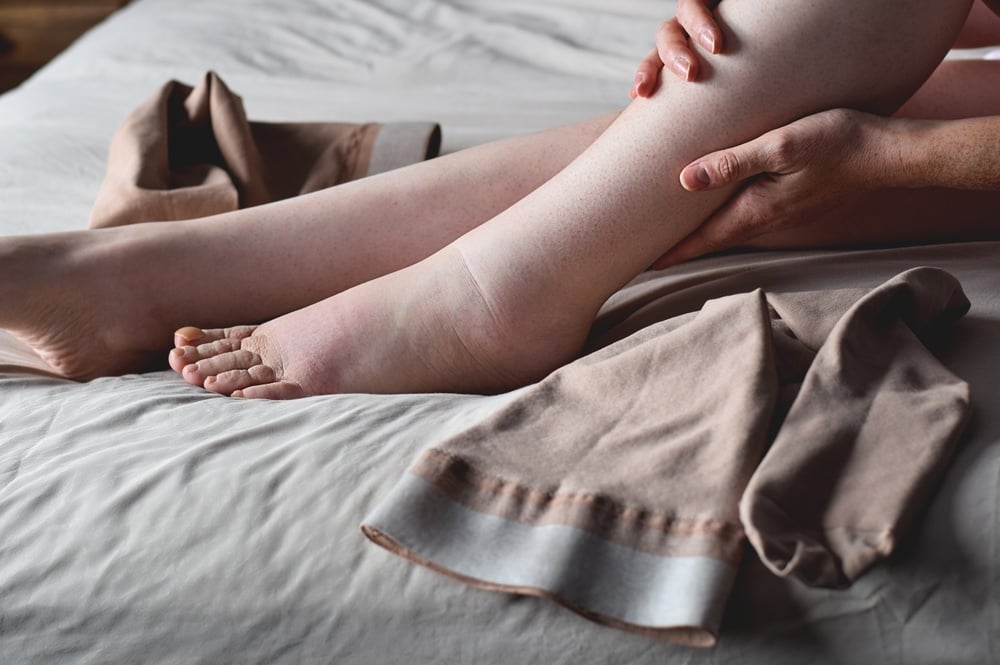A Guide to Understanding Leg Edema: What's Causing Your Swelling?

As a vein specialist, I frequently see patients concerned about swelling in their legs. This swelling, medically termed "edema," is something we address nearly every day in our practice. Understanding the source of the edema can be confusing, but this guide will help you understand why you are experiencing swollen legs, and most importantly…what can be done about it. If your leg edema is the result of a vein condition, the solution is easy and patients see success soon after the first few treatments.
What Is Edema?
Edema is simply the medical term for swelling that occurs when excess fluid becomes trapped in your body's tissues. While edema can affect any part of your body, including your hands and face, edema in the leg is particularly common and can stem from numerous causes, from simple lifestyle factors to more complex medical conditions.
Here are seven clues your health care practitioner will consider in determining the cause of your edema:
1. One Leg or Two? An Important Clue
One of the first things I look for when evaluating leg swelling is whether it's affecting one leg or both. This simple observation provides valuable diagnostic information:
Swelling in both legs typically suggests:
- A medication side effect
- A medical condition affecting your entire body
- Heart or kidney issues
Swelling in one leg often indicates:
- A localized process in that specific leg
- Possibly a vein condition
- Recovery from surgery (especially hip, knee, or ankle surgery)
- In some cases, a blood clot (though this usually causes pain when walking)
2. Timing Matters: How Long Have You Had the Swelling?
The timeline of your swelling can offer important clues about its cause:
Recent swelling (just a few weeks) is less typical for vein conditions. If your swelling appeared suddenly or has only been present for a short time, it's worth investigating other causes.
Gradual swelling that has developed over months or years is more characteristic of vein conditions. These don't develop overnight but build up slowly over time.
3. Travel-Related Swelling: A Common Concern
Many of my patients notice swelling after traveling, especially following long car rides or flights. This common issue typically has two components:
- Prolonged sitting which restricts circulation
- Dietary changes while traveling, including restaurant meals high in sodium and MSG
Your body is designed to hold onto salt as a survival mechanism, which means this type of swelling takes at least three days to begin subsiding. For most travelers, this isn't a serious medical concern, but rather a temporary response to changed circumstances.
Important exception: If travel-related swelling is accompanied by shortness of breath or significant pain when walking, seek urgent medical evaluation, as these could indicate a blood clot that requires immediate attention.
4. Seasonal Swelling: Why Summer Makes It Worse
"My swelling is terrible in the summer!" is something I hear frequently from patients. This is what we call physiologic swelling—meaning your body is actually functioning as designed.
During hot weather, your body regulates temperature by dilating blood vessels near the skin's surface to dissipate heat. This increased blood flow to your extremities also brings more fluid, resulting in more noticeable swelling in your legs. This is completely normal, and even after successful vein treatment, you may still experience some summer swelling.
5. Vein-Related Edema: Recognizing the Pattern
When swelling is related to a vein condition, it typically follows a characteristic pattern:
- Swelling improves overnight when lying flat
- Affects primarily the area from the knees down
- Accompanies other symptoms like aching, fatigue, cramping, or restless legs
- Often progresses to include general fatigue
Many patients with vein-related fatigue worry they have a heart condition because they feel so exhausted. However, in the vast majority of cases, it's their vein condition causing their circulation to slow down and creating that tired feeling.
6. Lymphedema: A Special Type of Swelling
Lymphedema is a specific type of edema that has some distinctive features that can help with self-diagnosis:
- The swelling doesn't go away overnight, even when sleeping flat in bed
- It extends down past the ankle to the top of the foot
- In advanced cases, a small hump develops on the top of the foot
- Eventually, the swelling affects the toes
Very few other conditions (except post-surgical swelling or trauma) cause this distinctive pattern that persists into the toes.
7. Medication-Related Swelling
Certain medications can cause leg edema as a side effect. One of the most common culprits I see in my practice is a class of blood pressure medicines called calcium channel blockers, particularly amlodipine. While these medications effectively control blood pressure, they can cause swelling in the legs that resolves once the medication is discontinued or changed.
If you're experiencing swelling in both legs and hands, it's important to have your healthcare provider evaluate for possible medical causes such as kidney issues, heart conditions, or medication side effects.
For Vein-Related Edema, Vein Treatments Work
For patients with vein-related edema, I'm happy to share that there's excellent news: in most cases, when swelling is due to a vein condition, it significantly improves or completely resolves after treatment. Modern vein treatments are minimally invasive and can make a remarkable difference in reducing leg swelling and improving your overall comfort.
When to Seek Medical Attention for Edema
While leg swelling is often benign, certain situations warrant prompt medical attention:
- Sudden, severe swelling in one leg (especially with pain)
- Swelling accompanied by shortness of breath
- Swelling with chest pain
- Swelling that doesn't improve with elevation or overnight rest
- Swelling that's warm, red, or painful to touch
If you're concerned about persistent leg swelling, I encourage you to speak with your healthcare provider. They can help determine whether your edema might benefit from evaluation by a vein specialist.
Understanding the cause of your leg swelling is the crucial first step toward finding effective relief. Many of my patients are surprised to discover just how much their quality of life improves once their edema is properly diagnosed and treated.




